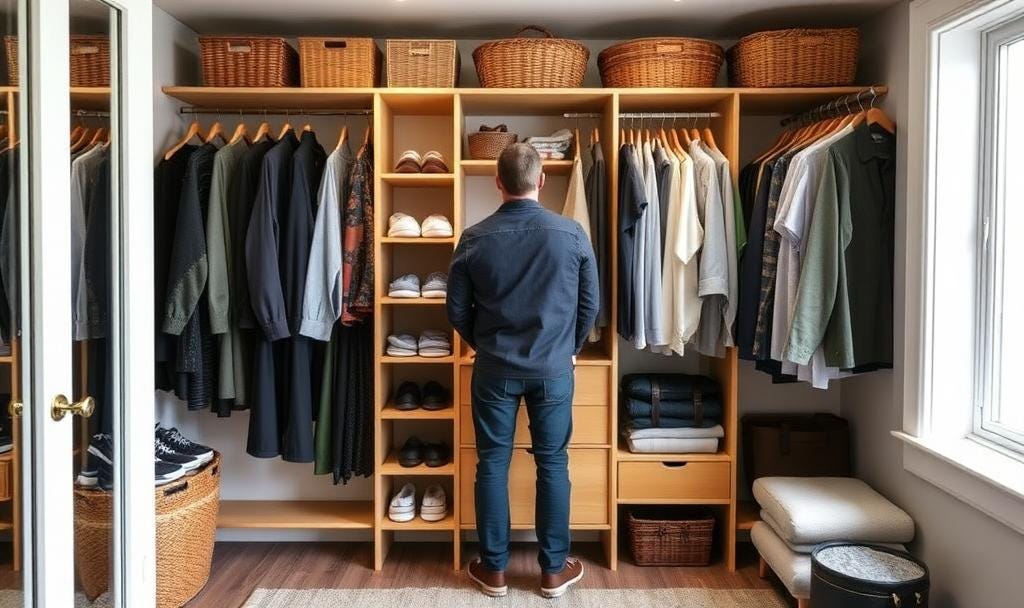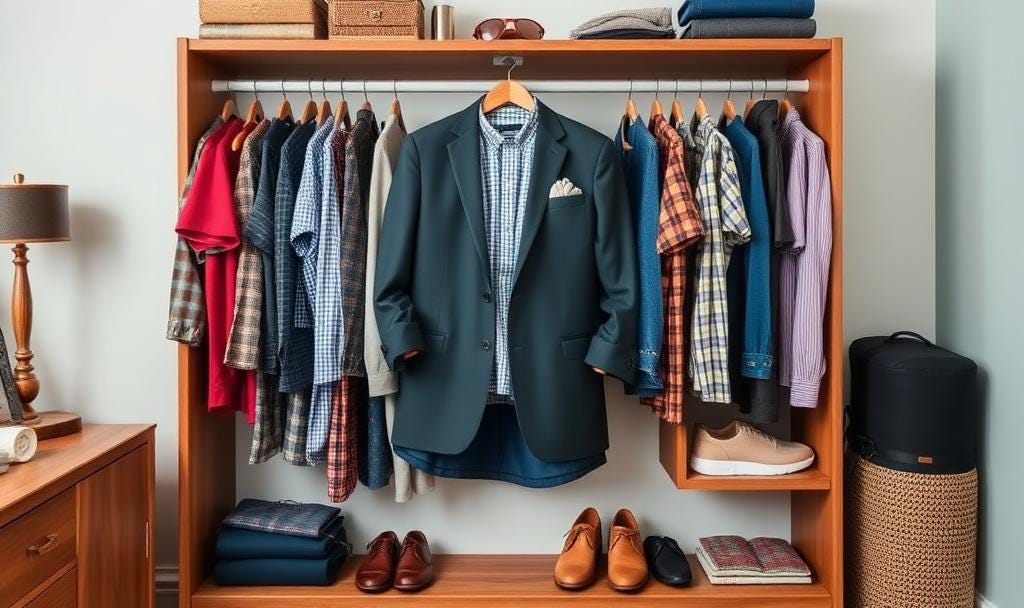For most of my adult life, I was the quintessential tech guy when it came to clothing. Khakis and a polo for work because that's what was required. Jeans and a t-shirt at home because comfort was king. I didn't think about how I looked because, frankly, I didn't think it mattered. I was focused on learning, working, achieving. Appearance felt superficial, maybe even vain.
Then came the airport incident.
My oldest son snapped a photo of me at the airport and texted it to my wife. They had a good laugh over my travel outfit choice. That moment stung, but not for the reason you might think. It wasn't wounded pride or embarrassment about fashion. It was the realization that instead of seeing someone they could count on, someone who could protect and lead them, they saw someone worthy of humor.
How can someone being made fun of be seen as a protector? How can a man who looks like he doesn't have his act together be trusted to have what his family needs when it matters most?
The Wake-Up Call
That airport photo was my wake-up call, but the implications went deeper than clothing. Research shows that predators, including those who target families, often look for what they perceive as weak or inattentive fathers. They want the path of least resistance. I realized that how I presented myself wasn't just about me - it was about my family's safety and my ability to fulfill my role as their protector.
The Engineering Approach to Style
As an engineer, I needed to approach this systematically. When I asked people with artistic minds about style, they couldn't explain it in terms I could process. They spoke in abstractions while I needed concrete principles and systems.
AI became my translator. I could prompt it to explain layering like an engineering concept: practical, logical, adaptable. Hot? Remove a layer. Cold? Add one. This made sense. From there, I developed a process: outfit selection, selfie, AI critique, refinement. I organized my closet like a system - pants here, dress pants there, short sleeves up, long sleeves down. Mix and match became as straightforward as selecting components.
The key insight was treating style as a learnable system rather than an innate talent. Goals come and go, but systems create scalability and consistent results.
The Confidence Factor
Here's what most men don't realize: when you put effort into your appearance, you immediately stand out because most men don't try. You will be different, and you have to be comfortable with that difference.
The confidence is relational. People notice. They may not say it directly to your face, but you'll hear it secondhand. Those who do approach you are invariably positive. This creates opportunities: networking, business relationships, deeper conversations. Dressing well has a direct impact on success because it affects how seriously people take you.
But the real transformation is internal. When you know you look put-together, you walk with your head higher. You speak with more authority. You carry yourself like someone who has figured things out.
The Deeper Meaning: Non-Conformity and Witness
Romans 12:2 says, "Do not conform to the pattern of this world, but be transformed by the renewing of your mind." Most people think this verse is only about moral behavior, but I believe it extends to how we present ourselves to the world.
We are creatures of habit, constantly chasing comfort and taking the easy path. Developing personal style challenges this tendency. It requires discipline, intentionality, and a willingness to stand out. It develops the muscle of non-conformity that serves us in every area of life.
Here's the uncomfortable truth: perception affects reception. Would you rather have a deep conversation about faith with someone who looks like they've given up on themselves, or with someone who appears to have figured out body, being, balance, and business? The gospel message doesn't change, but people's willingness to engage with the messenger absolutely does.
This isn't about being superficial - it's about being strategic. When people see you as someone who has "more to offer," they listen harder when you speak. They want what you have. And what I have is Jesus. Style becomes a bridge to deeper conversations and greater influence.
The Protection Principle
Looking good isn't about attracting attention - it's about commanding respect. When I dress well, I'm communicating that I know what I'm doing, that I'm paying attention, that I'm not someone to be dismissed or overlooked. This confidence makes predators think twice and makes my family feel secure.
My wife will never say it outright, but I can see the difference in her demeanor when her man looks like a strong leader rather than someone she needs to manage or worry about. She gets bragging rights. After the tough life she's had, any opportunity I can give her to feel proud and secure is worth the effort.
Beyond Fashion: A Lifestyle of Intentionality
Style is just the visible manifestation of a deeper principle: intentional living. When you're deliberate about how you present yourself, it flows into other areas. You become more intentional about your health, your relationships, your spiritual growth, your work.
Men are often one-trick ponies, known for just one thing. But when you demonstrate that you can master something as complex as personal style - something that requires ongoing attention and refinement - people begin to see you as someone with broader capabilities. They want to know what else you've figured out.
The Call to Excellence
For too long, Christian men have accepted mediocrity in how we present ourselves, hiding behind false humility or claiming that "God looks at the heart." But 1 Corinthians 10:31 tells us to do everything for the glory of God.
Excellence in appearance doesn't compete with spiritual depth; it complements it. It shows that we take seriously our calling to be set apart, to be lights in the darkness, to be men worth following.
The goal isn't to become fashion-obsessed or prideful. The goal is to become the kind of man whose family feels protected, whose presence commands respect, and whose influence extends beyond his immediate circle because people see him as someone who has his life together.
The Challenge
If you've been coasting on comfort and convenience, I challenge you to see style as stewardship. Stewardship of your influence, your family's security, your witness, and your calling as a man of God.
Start with systems: organize your wardrobe, develop a process, treat it like any other skill worth mastering. Be prepared to stand out. Be comfortable being different. And remember that the goal isn't to impress people with your fashion sense - it's to remove barriers to deeper influence and greater impact.
The world needs men who look like they know what they're doing, because too many of us have abdicated that responsibility for too long. Your family needs to see you as someone they can count on. Your community needs leaders who command respect not through force, but through presence and competence.
Style is about the confidence, the intentionality, and the influence that comes with taking yourself seriously enough to put in the effort. Like making your bed every day.
That's the deeper meaning. That's why it matters.
Want to dig deeper into topics like this?
This is exactly the kind of real talk we have in our men's community - challenging the comfortable narratives, exploring what biblical masculinity actually looks like in practice, and helping each other level up in every area of life.
We don't do surface-level "be nice" Christianity. We tackle the hard questions about leadership, influence, protection, and what it really means to be a man who doesn't conform to the world's patterns of mediocrity.
Join us: https://www.skool.com/realjbm-6731/about?ref=09dd4292245d43d28e7b4f22a8fe57d0
For men who want more than participation trophies and church small talk.





